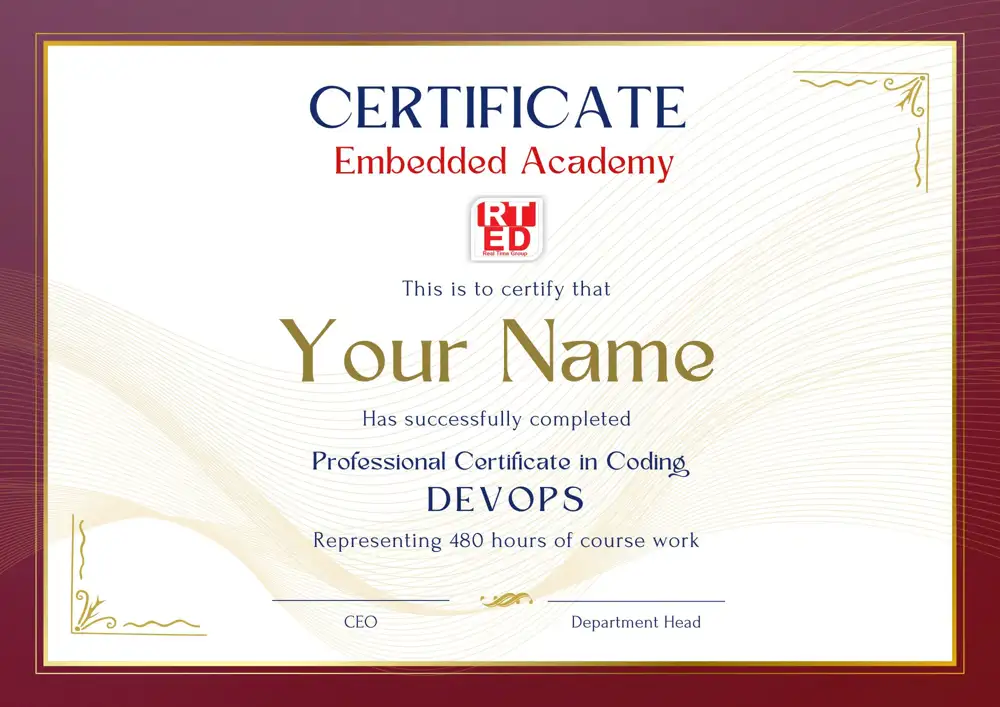
Lead the implementation of CI/CD pipelines and automate infrastructure management.
Annual Salaryclose

The DevOps course focuses on nurturing students to become hired professionals who land a position as a DevOps Engineer, as we know what it takes to integrate you into the industry.
In a world where software development processes and technological infrastructures are becoming increasingly complex, DevOps engineers are considered critical professionals who help organizations improve their efficiency and innovation. The DevOps field bridges development and operations, combining tools like Continuous Integration (CI), Continuous Deployment (CD), and Infrastructure as Code (IaC) to create optimized workflows and ensure continuous improvement of products.
This course prepares graduates to integrate into one of the critical processes in high-tech companies, addressing organizational culture and existing software development practices. The goal is to ensure communication, collaboration, and efficiency between software developers and IT professionals, aiming to shorten development cycles and rapidly deliver new products or versions to customers.
The course covers extensive knowledge in development and operations, coding, infrastructure management, system management, and dedicated DevOps tools (such as Jenkins, Docker, Kubernetes, Ansible, Terraform). It also provides a deep understanding of cloud architecture (AWS - Amazon Cloud), source control, code reviews, and familiarity with Agile principles.
Although each organization strives to streamline and accelerate the development cycle, the implementation of work methodologies can vary from one organization to another. Therefore, the DevOps course provides a variety of tools related to all development and software deployment processes. Familiarity with the different development stages is essential for anyone aiming to accelerate these processes.
As a software house providing DevOps services to various companies domestically and internationally, we perform cloud migrations, paying attention to client and employer requirements, the technical knowledge and popular DevOps tools, and the need to gain practical experience.
In line with industry needs, we have developed a comprehensive curriculum for DevOps Engineers, including all the necessary tools for working in the industry. Alongside practical training in our development department, and performing real-world tasks shoulder to shoulder with our engineers, this experience will enable you to break into the field, grow, and work as a DevOps Engineer. With our industry-expert curriculum, you will receive comprehensive and practical training tailored to the current market needs:
By learning DevOps with us, you'll master the integration of development and operations, ensuring a smooth, automated, and efficient workflow, crucial for modern software and infrastructure management. Join us to enhance your skills and secure a rewarding career in this dynamic field.
Programming Tools and Languages
Skills & Techniques
Upon completing our DevOps course, you'll be well-positioned to integrate into various roles within the tech industry.
These roles are in high demand across various industries, including technology, finance, healthcare, and e-commerce. The skills you gain from our DevOps course will make you a valuable asset to organizations looking to modernize their IT practices and improve their software delivery capabilities.
Here are some key positions you can pursue:
Lead the implementation of CI/CD pipelines and automate infrastructure management.
Annual SalaryEnsure the reliability and performance of large-scale systems and applications.
Annual SalaryDesign and manage cloud-based infrastructure across multiple platforms.
Annual Salary
Develop and implement automation solutions to streamline IT operations.
Annual SalaryBuild and maintain scalable platforms that support development and operations teams.
Annual SalaryDevOps Track: From Novice to Expert
Launch your career in DevOps with our most comprehensive educational track. This program is meticulously designed to provide you with an all-encompassing understanding of the field, ensuring you achieve the highest level of expertise.
Key Features:
This track is your gateway to becoming a proficient DevOps expert, equipping you with the knowledge, skills, and hands-on experience needed to excel in this rapidly evolving and in-demand area of technology.
| CI/CD | Course duration | |
|---|---|---|
| Jenkins Course | 30 academic hours | |
|
Master continuous integration and delivery automation using Jenkins pipelines and build management.
| ||
| Docker Course | 30 academic hours | |
|
Learn containerization for consistent application deployment and management across environments.
| ||
| Kubernetes Course | 30 academic hours | |
|
Master container orchestration for scaling and managing distributed applications.
| ||
| HELM Course | 10 academic hours | |
|
Learn package management for Kubernetes applications using Helm charts and templates.
| ||
| Ansible Course | 25 academic hours | |
|
Master infrastructure automation and configuration management using Ansible playbooks.
| ||
| Automation Devops | Course duration | |
| Linux Admin Course | 50 academic hours | |
|
Master Linux system administration, from basic commands to advanced system management, security, and networking.
| ||
| Bash Scripting Course | 25 academic hours | |
|
Learn shell scripting for task automation, system administration, and efficient command-line operations in Linux environments.
| ||
| SQL Course | 30 academic hours | |
|
SQL is a special-purpose programming language designed for managing data in a relational database. Learn how to use SQL to store, query, and manipulate data.
| ||
| Python Course | 90 academic hours | |
|
Focusing on Python 3, you’ll learn to program object-oriented, real-industry applications.
| ||
| Networking Course | 40 academic hours | |
|
Master computer networking fundamentals, protocols, and implementation for robust network applications.
| ||
| GIT (Version Control) Course | 25 academic hours | |
|
Learn Git’s core features and workflow, different ways to undo changes or save multiple versions, and collaborate with other teams and developers.
| ||
| Monitoring And Cloud | Course duration | |
| Grafana Course | 15 academic hours | |
|
Build dynamic dashboards for monitoring and visualizing metrics and system performance.
| ||
| Zabbix (Prometheus) Course | 25 academic hours | |
|
Learn enterprise-level monitoring and alerting for IT infrastructure and applications.
| ||
| Terraform Course | 20 academic hours | |
|
Master infrastructure as code for automated cloud resource provisioning and management.
| ||
| AWS Course | 35 academic hours | |
|
Gain an in-depth understanding of Amazon Web Services architectural principles and services, design and scale AWS Cloud implementations with best practices recommended by Amazon.
| ||
Tuition
$18,500
$22,000
DevOps Specialist Track
Elevate your software development expertise with our focused DevOps program. This track is carefully crafted for professionals with prior experience in software and application development, aiming to sharpen your skills in this specialized domain.
Key Features:
This track offers a streamlined path to mastering DevOps , ideal for seasoned developers looking to expand their expertise or pivot into this high-demand field. Gain the specific knowledge and skills needed to excel in DevOps development and stand out in the competitive tech industry.
| CI/CD | Course duration | |
|---|---|---|
| Jenkins Course | 30 academic hours | |
|
Master continuous integration and delivery automation using Jenkins pipelines and build management.
| ||
| Docker Course | 30 academic hours | |
|
Learn containerization for consistent application deployment and management across environments.
| ||
| Kubernetes Course | 30 academic hours | |
|
Master container orchestration for scaling and managing distributed applications.
| ||
| HELM Course | 10 academic hours | |
|
Learn package management for Kubernetes applications using Helm charts and templates.
| ||
| Ansible Course | 25 academic hours | |
|
Master infrastructure automation and configuration management using Ansible playbooks.
| ||
| Automation Devops | Course duration | |
| Linux Admin Course | 50 academic hours | |
|
Master Linux system administration, from basic commands to advanced system management, security, and networking.
| ||
| Monitoring And Cloud | Course duration | |
| Grafana Course | 15 academic hours | |
|
Build dynamic dashboards for monitoring and visualizing metrics and system performance.
| ||
| Zabbix (Prometheus) Course | 25 academic hours | |
|
Learn enterprise-level monitoring and alerting for IT infrastructure and applications.
| ||
| Terraform Course | 20 academic hours | |
|
Master infrastructure as code for automated cloud resource provisioning and management.
| ||
| AWS Course | 35 academic hours | |
|
Gain an in-depth understanding of Amazon Web Services architectural principles and services, design and scale AWS Cloud implementations with best practices recommended by Amazon.
| ||
Tuition: $16625.00
Payment Plans
As Low As$330/Month

Dmitri Danilov
Head of QA and DevOps Departments
Holds a Bachelor of Science in Computer Science, Network manager, and C++ developer. UI/UX user interface developer for Android applications. Has a vast experience working with Jenkins, Git, Docker, K8S, Ansible, and as a Linux admin.
Students must complete the following to be eligible for DevOps certification:
As part of the professional experience each graduate undergoes we help in integrating them into the high-tech world through our job search assistance, personalized resume building, and placement in a technology company.
1
Curriculum customization
We'll help you choose and structure the right program most suitable for your needs and career aspirations.
2
Tech Training
Students who start with no prior knowledge of the field will receive the fundamentals required to complete the course.
3
Final Project
Working on your course project and internship with experienced developers.
4
Internship
Get real-world experience adapted to industry standards and requirements with our team of industry-leading engineers.
5
Job Interview
Graduates get resume-building assistance, interview simulations and career guidance.
After completing the DevOps training program, you can integrate into a wide variety of companies in the IT industry. This includes leading companies in the market, private companies, startups, and more. There is a significant demand today for skilled DevOps professionals with experience in working with servers and advanced tools that can enhance processes and streamline all aspects of software development and maintenance.
The DevOps training program includes hands-on practical work in the form of homework assignments, exercises, and the creation of a diverse portfolio of projects. This is aimed at gaining practical experience and being prepared to start working in the IT industry immediately upon completing the training program.
A DevOps team consists of developers and IT operations professionals who collaborate throughout the entire product lifecycle to enhance the speed and quality of software deployment. This represents a new way of working, a cultural shift that has significant implications for the teams and organizations they work in.
Under the DevOps model, development and operations teams are no longer 'silos'. Sometimes, these two teams merge into one where engineers work across all phases of the application's lifecycle—from development and testing to deployment and operation—possessing a range of cross-functional skills.
DevOps teams utilize automation and process acceleration tools to increase reliability. The DevOps toolchain assists teams in tackling important DevOps principles, including continuous integration, continuous delivery, automation, and collaboration.
DevOps values are occasionally implemented on teams beyond development. When security teams adopt a DevOps approach, security becomes an active and integrated part of the development process. This is referred to as DevSecOps.
Currently, DevOps classes are held online.

